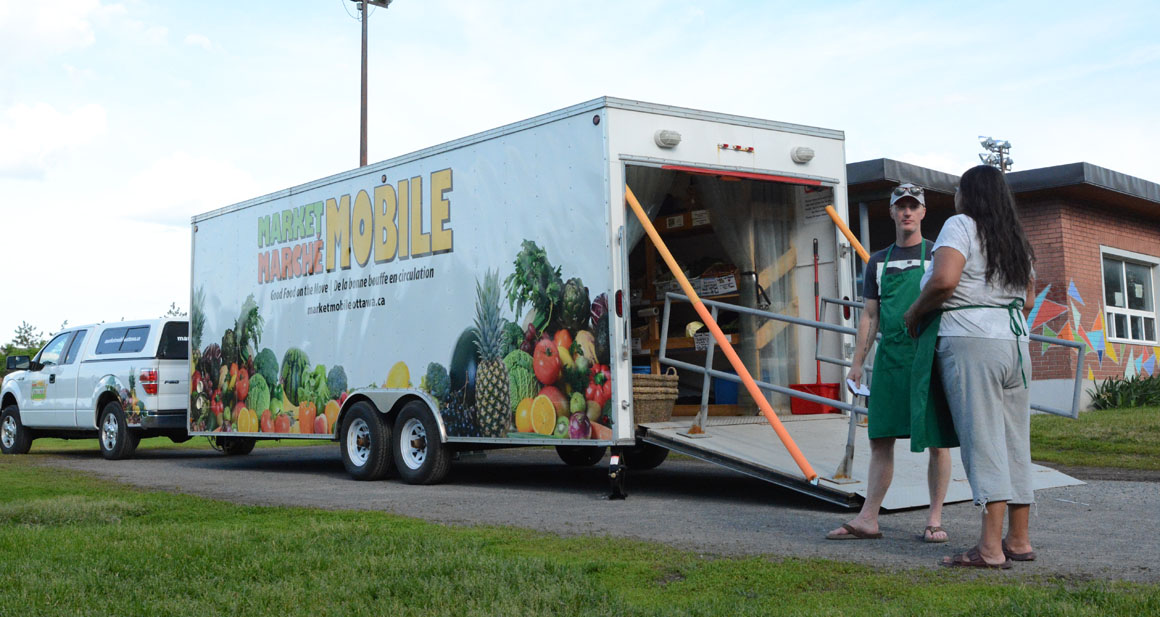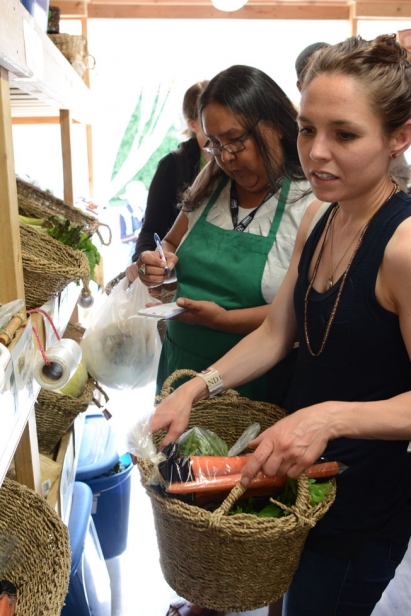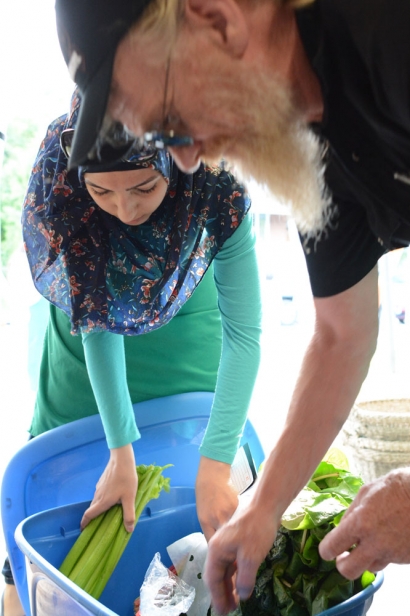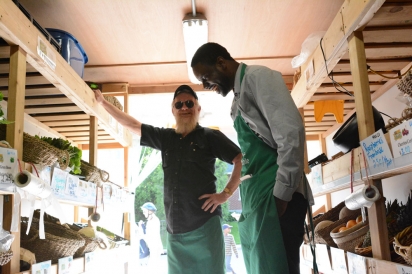A Market on the Move
Even a torrential downpour doesn’t stop people from lining up outside the Market Mobile on a dark and dreary Thursday afternoon. Once the trailer doors swing open, the driver, Len Blom, begins ushering in small groups of customers into the pop-up grocery store on wheels. They peer along the plywood shelves lining each wall, into the wicker baskets holding fresh fruits and vegetables inside the 20-foot trailer.
“Do you like pineapple?” he asks, “I’ll give you a deal. One for $3.50 or two for $7.” He smiles broadly and waits to see who will pick up on the joke. His chipper banter keeps up throughout the next hour while customers continue to trickle in from the rain, exploring what produce, herbs, dried goods and locally roasted coffee the Market Mobile has hauled to their community’s doorstep in Laroche Park.
The neighbourhood is one in transition — small low-rise apartments and modern infill homes line the streets and intermingle with several dilapidated dwellings — somewhat isolated from the rest of Hintonburg. On the fringes of Mechanicsville, the park is the Market’s third stop of the day (it has already visited Lowertown and Carlington — and will head on to Morrison Gardens in the west-end afterwards) where the discount grocery store is offering access to affordable, fresh and healthy foods, and a sense of community, to whoever wishes to shop there.
“Our goal has always been to reduce the poverty stigma,” says Kaitrin Doll, a long-time social activist and leader of food security initiatives with Ottawa’s Coalition of Community Health and Resource Centres (CCHRC). She helped the CCHRC launch the Mobile Market social enterprise three years ago in hopes of bringing more nutritious food into some of Ottawa’s more underserviced neighbourhoods, using food as a tool to bring communities together, regardless of social status. “The Market Mobile is available to anyone — the more diversity we see, the more we can break down those barriers.”
Staying true to that social mission is imperative to the Mobile Market’s business model and to anyone who chooses to set up their business as a social enterprise. Following on the heels of the DIY and support-local movements, social enterprising has offered community-minded entrepreneurs and organizations a new means to their social end — a business model that places people ahead of profits.
But at the end of the day there still needs to be money in the till. “There needs to be a balance between our social mission and the business operations,” says Doll, who first explored the Market Mobile concept on a donated OC Transpo bus in 2014. For the 21-week pilot program, Doll and a crew of volunteers converted the chauffeured bus into a makeshift grocery store, hustling between community centres and parks in Vars, Hunt Club East, Carlington and Morrison Gardens every Saturday.
“It was a lot of work,” Doll remembers, “we were tearing down the bus every time.” After winning the Community Foundation of Ottawa’s New Leaf Grant in 2015, the Market Mobile was able to purchase its own wheels, a truck and trailer combo, hire a project officer and two part-time drivers and extend their services to two days a week.
The market now rolls into eight communities across Ottawa on Wednesdays and Thursdays, chosen through a scoring of variables such as ease of access to affordable groceries, demographics and what community supports are already in place. The trailer arrives stocked with high-quality, yet low-priced, foodstuffs it purchases through a wholesale-buying program with Loblaws and Just Food’s Community Food Hub. As the growing season gets underway in June, they will also be offering a selection of locally grown and organic produce from nearby farms, all of which the Mobile Market sells on a cost-recovery basis.
But the Market Mobile is faced with the same challenges of any business, if not more so. “We have our operational costs covered through our sales, but we still rely on funding to pay the salary of the project officer,” Doll says. Like most social enterprises, the aim of the Market Mobile is to be financially independent. They are currently part of an accelerator program with the Centre for Innovation in Social Enterprise Development, which is helping them create a better business structure in hopes of finding financial sustainability. Doll is also exploring a few different campaigns to help boost sales, such building a greenhouse to supply the market or offering the Mobile Market for hire to private businesses that want to encourage healthier eating among their employees.
One simple approach is their “Buy one, Give one” offer. “It’s for people who want to give something while they are doing their own shopping,” Doll explains. Items purchased this way are available in a donation basket by the cash at the front of the trailer where anyone can help themselves.
Leftovers are definitely a risk the Market Mobile cannot afford. Through arrangements with the Heartwood House’s own social enterprise, ALSO (Alternative Learning Styles and Outlooks), and the Rideau-Rockcliffe Community Centre’s Good Food Market, the Market Mobile ensures they clear their shelves. But Shannon Szkurhan, the market’s project officer, believes there is potential for more partnerships. “We would love to have more local restaurants on board to purchase remaining produce from the Market Mobile each week,” she says, “This would give us more confidence to order larger quantities to ensure that we don't sell out of those items that are the most in demand by our customers.” Community partnerships are key to the success of social enterprises, which tend to walk a bit of tightrope to balance the books. Often tethered to a charitable or non-profit organization to get them off the ground, they rely on the tenacious and precarious work of grant writers to keep them afloat.
Nevertheless, the business model needs to be sound and that comes down to offering a product or service that people are willing to buy, whether it’s a social enterprise or not.
“We really just need to see more customers,” Doll says.
As Len Blom wraps up a sales order for two oranges, two kiwis, one cucumber, one bunch of kale, the total comes to four dollars. Even with a pineapple tossed in, the grocery bill is still one heck of a bargain. With food at the crux of some our most profoundly dire societal ills — homelessness, hunger, poverty, isolation — it’s a bargain with a big message: good food has the power to heal, but it will take more than an appetite for goodwill to keep it in business.
Market Mobile
marketmobileottawa.ca
613.745.0073








